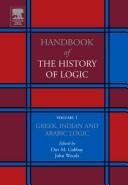| Listing 1 - 3 of 3 |
Sort by
|

ISBN: 9780444515964 0444515968 9780444504661 9780444516251 9780444516251 9780444516107 9780444516206 9780444516213 9780444516220 9780444516237 9780444529374 0444516220 1280630930 9781280630934 0080463037 9780080463032 0444516204 9780080885476 0080885470 1281144932 9781281144935 0444504664 0444516255 9780444516114 0444516115 0444516107 0444516212 0444516239 9780444529367 0444529365 0444529373 9780080931692 0080931693 1283134039 9781283134033 9786613134035 9786610630936 9786611028978 1281028975 008054939X 9786611054625 1281054623 0080532861 9786611189518 1281189510 0080560857 9786613611741 1280581964 0080930662 0080931707 1283734249 Year: 2012 Publisher: Amsterdam : Elsevier,
Abstract | Keywords | Export | Availability | Bookmark
 Loading...
Loading...Choose an application
- Reference Manager
- EndNote
- RefWorks (Direct export to RefWorks)
Set theory is an autonomous and sophisticated field of mathematics that is extremely successful at analyzing mathematical propositions and gauging their consistency strength. It is as a field of mathematics that both proceeds with its own internal questions and is capable of contextualizing over a broad range, which makes set theory an intriguing and highly distinctive subject. This handbook covers the rich history of scientific turning points in set theory, providing fresh insights and points of view. Written by leading researchers in the field, both this volume and the Handbook as a whole
Logic --- Logique --- History. --- Histoire --- Induction (Logic) --- Philosophy --- History --- Logic. --- Argumentation --- Deduction (Logic) --- Deductive logic --- Dialectic (Logic) --- Logic, Deductive --- Intellect --- Psychology --- Science --- Reasoning --- Thought and thinking --- Methodology --- Set theory. --- Logic, Symbolic and mathematical. --- Many-valued logic. --- Nonmonotonic reasoning. --- Algebra of logic --- Logic, Universal --- Mathematical logic --- Symbolic and mathematical logic --- Symbolic logic --- Mathematics --- Algebra, Abstract --- Metamathematics --- Set theory --- Syllogism --- Aggregates --- Classes (Mathematics) --- Ensembles (Mathematics) --- Mathematical sets --- Sets (Mathematics) --- Theory of sets --- Logic, Symbolic and mathematical --- Non-monotonic reasoning --- Logic, Many-valued --- Logic, Multivalued --- Logic, Variable-valued --- Multivalued logic --- Variable-valued logic --- Nonclassical mathematical logic --- Values
Digital
ISBN: 0444529373 9780444529374 Year: 2012 Publisher: Amsterdam Elsevier North Holland
Abstract | Keywords | Export | Availability | Bookmark
 Loading...
Loading...Choose an application
- Reference Manager
- EndNote
- RefWorks (Direct export to RefWorks)
The Handbook of the History of Logic is a multi-volume research instrument that brings to the development of logic the best in modern techniques of historical and interpretative scholarship. It is the first work in English in which the history of logic is presented so extensively. The volumes are numerous and large. Authors have been given considerable latitude to produce chapters of a length, and a level of detail, that would lay fair claim on the ambitions of the project to be a definitive research work. Authors have been carefully selected with this aim in mind. They and the Editors join in the conviction that a knowledge of the history of logic is nothing but beneficial to the subject's present-day research programmes. One of the attractions of the Handbook's several volumes is the emphasis they give to the enduring relevance of developments in logic throughout the ages, including some of the earliest manifestations of the subject. Covers in depth the notion of logical consequenceDiscusses the central concept in logic of modalityIncludes the use of diagrams in logical reasoning.
Book
ISBN: 9814360961 9789814360968 9814360953 9789814360951 Year: 2012 Publisher: Singapore World Scientific
Abstract | Keywords | Export | Availability | Bookmark
 Loading...
Loading...Choose an application
- Reference Manager
- EndNote
- RefWorks (Direct export to RefWorks)
This comprehensive book provides an adequate framework to establish various calculi of logical inference. Being an 'enriched' system of natural deduction, it helps to formulate logical calculi in an operational manner. By uncovering a certain harmony between a functional calculus on the labels and a logical calculus on the formulas, it allows mathematical foundations for systems of logic presentation designed to handle meta-level features at the object-level via a labeling mechanism, such as the D Gabbay's Labelled Deductive Systems. The book truly demonstrates that introducing 'labels' is us
Logic. --- Modality (Logic) --- Modal logic --- Logic --- Nonclassical mathematical logic --- Bisimulation --- Argumentation --- Deduction (Logic) --- Deductive logic --- Dialectic (Logic) --- Logic, Deductive --- Intellect --- Philosophy --- Psychology --- Science --- Reasoning --- Thought and thinking --- Methodology
| Listing 1 - 3 of 3 |
Sort by
|

 Search
Search Feedback
Feedback About UniCat
About UniCat  Help
Help News
News